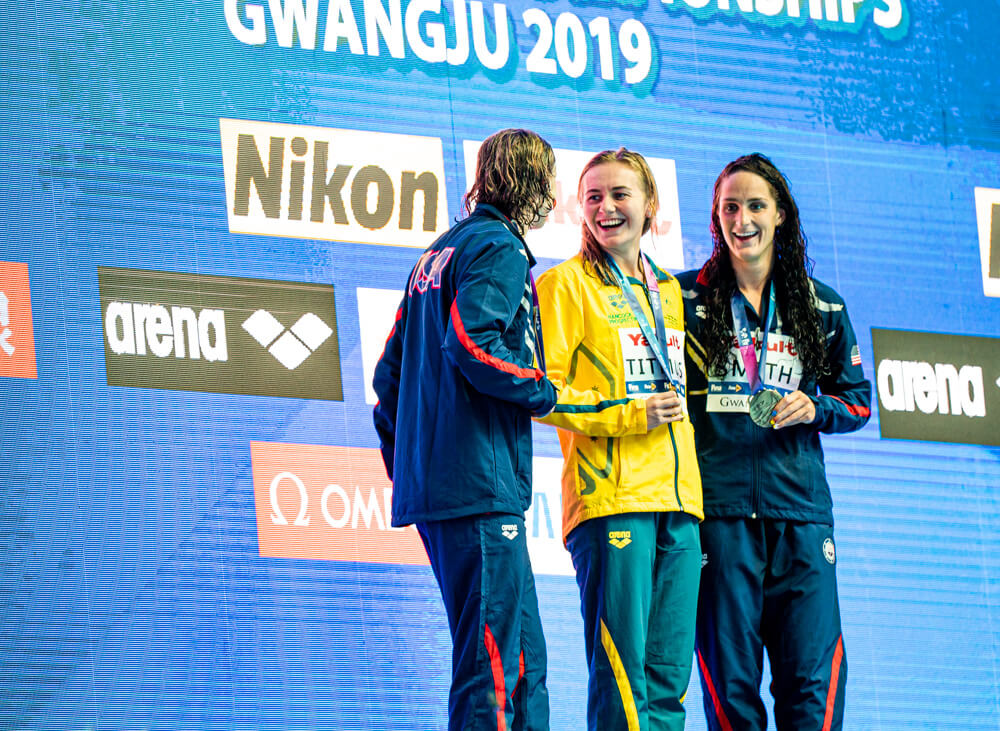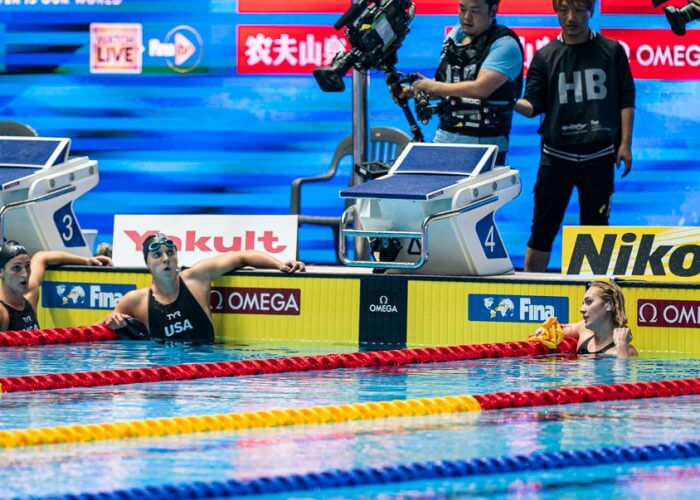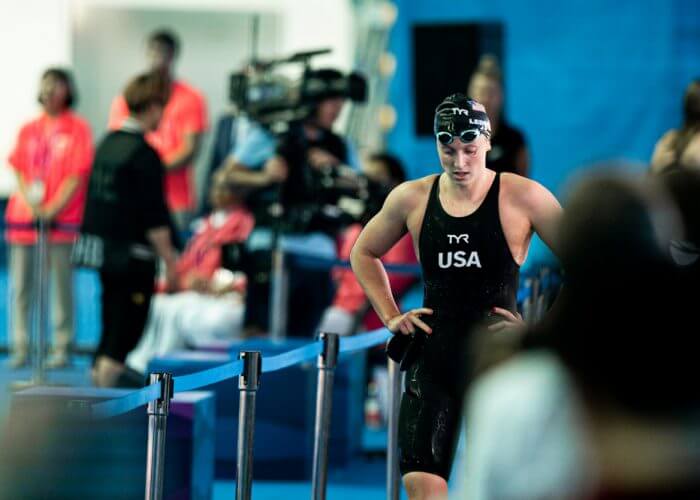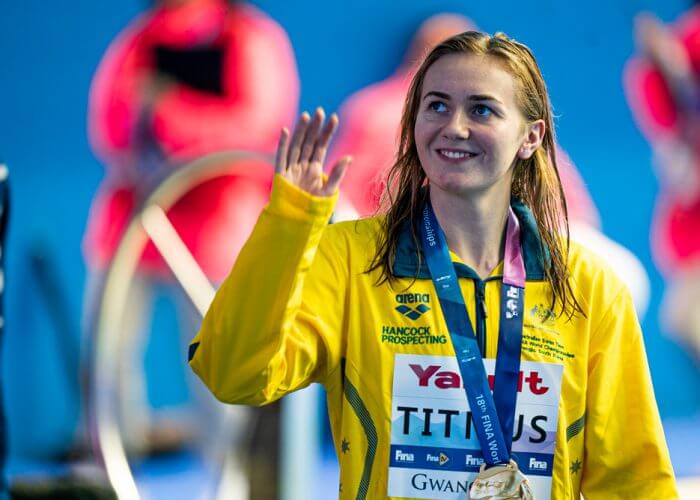One Year Out From Olympic 400 Free Final: Ariarne Titmus Says She’s Yet To Beat Katie Ledecky Fair & Square

Editorial content for the 2021 Tokyo Olympic Games coverage is sponsored by GMX7.
See full event coverage. Follow GMX7 on Instagram at @GMX7training #gmx7

Australian ace Ariarne Titmus still has one key goal that the world’s best women distance freestylers all have: to get a hand to the wall ahead of Katie Ledecky, the American who has carved out living-legend status since claiming Olympic gold over 800m freestyle eight years ago at the London 2012 Olympic Games.
Hold on, I hear you say. She’s done that; ticked the box; won the 400m freestyle World title ahead of the Olympic champion and World record holder.
Not so quick, replies Titmus, one year out from the day of the rescheduled 400m freestyle final at Tokyo202One. You don’t tick the box on Ledecky unless you do it fair and square, Titmus tells reporter Julian Linden at the Australian Telegraph today. Says the Australian:
“Imagine if she was well, I’m guessing she probably would have beaten me, I still believe she’s better than me.”
Titmus did not only get her hand to the wall ahead of Ledecky in Gwangju last year to halt a bull run of 2013, 2015 and 2017 victories for the American but she did so after lagging behind her rival, catching up, feeling the response of a champion in the next lane and then doing something no-one has ever done to Ledecky as long as we’ve all known her: she passed her.

Lanes apart: Ariarne Titmus and Katie Ledecky after the 400m upset – Photo Courtesy: Becca Wyant

Katie Ledecky – Photo Courtesy: Becca Wyant
The clock screamed 3:58.76, a Commonwealth and Oceania record. Ledecky: 3:59.97. A fair chunk down on her best, the World record of 3:56.46, clocked for the Olympic title claimed at Rio 2016. The win placed Titmus 8th on the all-time performances ranking as second-swiftest woman ever, Ledecky the owner of the best seven efforts in history.
The American was so out of sorts and so far out of the loop of her experience that she did not immediately congratulate Titmus after the race was swum. A thoughtful exit from the deck ensued.
Could this be it? Champion down? Job done?
No, at least not for Ariarne Titmus, she tells Linden, with a strong nod to Ledecky’s sickness in Gwangju: when Titmus attacked in the 400m freestyle final on the opening day of action at World titles, on July 21, the American had no lasting response. She simply could not go there that day. She looked out of sorts – and, as it turned out, was.
Ledecky withdrew from the 200m and the 1500m, consulted doctors, restored up and let her body recover as much as possible within the timeframe of a week, from whatever it was that left her shy of fighting fit. Watched if not quite a Roman conquest of her events then an Italian one at least, Simona Quadarella taking an historic gold over 1500m on July 23, Federica Pellegrini claiming a record fourth gold among a record eight podium places over the 200m on July 25.
On the morning of July 26, Ledecky rose, felt good enough to see what the 800m heats felt like: not bad, was the answer as she claimed her place in lane 5 on 8:17.42, 0.19sec down on the pace of USA teammate Leah Smith, Titmus on 8:19.43, Quadarella on 8:20.86, ahead of China’s Wang Jianjiahe, 8:20.91, and Germany’s Sarah Köhler, 8:22.95.
The final was the next day and what we saw was something we’d never seen before from Ledecky as she made it record World title number 4 since 2013. It wasn’t quite a miracle, given the gap between 8:13.58 and her pioneering time-warp 8:04.79 (surely one of the greatest performances in swimming history), but the grit and gust of the girl was back, with a smile on her face after a race in which three national records followed her home: Quadarella on 8:14.99; Titmus on 8:15.70, an Oceania standard, too; and Köhler on 8:16.43 as the first German woman to race inside the 1987 adopted national standard of 8:17.53 set by Anke Möhring, of the GDR, in a then World record for the European title in Strasbourg on August 19 that year.
Thirty two years had gone by. Might we expect that length of time to pass before the rest of the World catches up with Ledecky’s 8:04? Perhaps, given that Janet Evans’ 8:16.22 of 1989 took 19 years to get to by one swimmer, Rebecca Adlington, for Olympic gold in 2008. Eight years on – and 31 years since Evans’ epic, the American remains No9 ranked all-time, all suits, and No7 in textile. So, it may well be the 100th anniversary of the London 1948 Games before the 800m title goes to a swimmer swimming faster than Ledecky at her best (unless she does that herself).
Ariarne Titmus Still Has The Goal Of Being Ledecky – When She’s Well

Ariarne Titmus – Photo Courtesy: Becca Wyant
It is against that kind of backdrop and with an understanding of the magnitude of Ledecky’s pioneering pace-setter and five-time Olympic gold medallist that Titmus speaks with respect for what it means to “beat” the reigning American champion. Titmus tells Linden:
“I’ve beaten her but she said she was so sick so it still kind of sits a little bit, I don’t know how to describe it, but you didn’t beat someone when they are at their best. Imagine if she was well, I’m guessing she probably would have beaten me, I still believe she’s better than me.”
Linden writes: “Titmus beat the American again to collect a second gold medal as the lead off swimmer in the Australian 4x200m relay team that broke the world record but Ledecky turned the tables on her to win the individual 800m, her strongest event. Their rematch over 400m at the Tokyo Olympics is now the blockbuster race everyone wants to see.”
He notes that NBC, the American television giant that has prime Olympic rights, travelled to the Gold Coast at the start the year to film a special interview with Titmus that will be broadcast in the lead up to the 400m freestyle showdown, which “U.S. executives expect will be one of the most-watched swimming races in history”.
Ariarne Titmus knows, expects and understands that racing Ledecky for Olympic gold will be the tallest challenge of her career. She refuses to see herself as a target and the one to beat because of Gwangju 2019 and notes that defeat is often a fine motivator:
“Her, maybe not having the meet she wanted in Gwangju, if I was in her shoes that would have spurred me on a bit more. That’s why I was pretty excited to race her this year because I think it would have been a battle of us both at our absolute best so I think the Olympics next year is just going to be another level.”
At 23, Ledecky is four years older than Titmus and, given the impact of the COVID-19 pandemic that washed away the sports calendar, may end this year without having raced below 3:58.5, Linden notes, since May 2018. There’s no telling where the story will go but Ariarne Titmus counts no chickens, not even feathers. She does, however, see the one-year delay to the Olympic Games as an opportunity:
“I think I was running out of time to fix a couple of things so that’s given me more time to do that. Nothing changes, I just have an extra 12 months and I think that’s the best way to look at it.”




